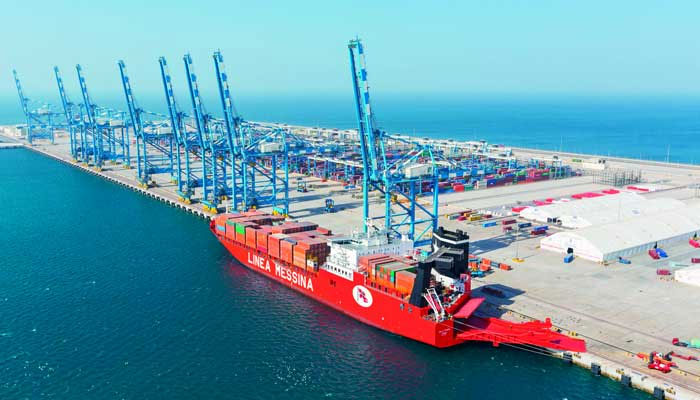Private sector asked to lead CPEC’s new direction of development
ISLAMABAD: China-Pakistan Economic Corridor (CPEC) is moving to a new direction of industrial and agriculture development, which will require the private sector to play a bigger in collaboration with technology companies, commerce adviser said on Thursday.
“The government will facilitate at the maximum level to ensure the establishment of large-scale manufacturing units and information technology zones under CPEC,” said Abdul Razak Dawood, Advisor to the Prime Minister for Commerce and Investment at the first meeting of the recently re-constituted CPEC Business Council.
Dawood chaired the meeting to create an interface between the government and business community and to further the China-Pakistan industrial cooperation for mutual benefit.
Minister of State/Chairman, Board of Investment (BoI) Atif R Bokhari, Chairman CPEC Authority Asim Saleem Bajwa, Secretary BOI Fareena Mazhar, members of the council and BOI’s officials attended the meeting.
During the meeting Dawood highlighted Pakistan’s potential in petrochemical, steel manufacturing, and IT sectors, appreciating the recommendations provided by the members for the development of projects in these sectors with the help of Chinese and other potential investors.
BOI’s Bokhari said the government was fully committed to ensuring a business-friendly environment by providing competitive incentives to the industry.
He said efforts were being made to achieve the efficiency in Special Economic Zones (SEZs) by placing one window operation matching with the global practices.
“Rashakai will be a model zone to be established, followed by Dhabeji which is uniquely placed and open for local and foreign investors equally” the BOI chief added. He said the government was endeavouring to develop SEZs in services sector and approval had been accorded to IT Zones to facilitate information technology and software development.
“Electronic vehicle and mobile phones manufacturing policies have been introduced and the same could be adopted for hardware manufacturing with support of the private sector,” he stated.
Earlier, the members proposed the inclusion of new sectors and projects in CPEC. It was proposed that petrochemical and its domestic production at competitive prices require the establishment of petrochemical cracker and it is the best possible option to include this project into CPEC.
Private sector representatives attending the meeting recommended that RMB transaction should be facilitated for bilateral trade and investment with China and in addition to business visas, facilitation in getting work visa for foreign experts also be enhanced.
They also suggested that infrastructure development such as manufacturing of hardware in IT sector would help to grow, expand, and boost the economy.
Pakistani institutes may take advantages of Chinese advancement in IT sector by ensuring transfer of technology, the representatives added.
Another suggestion was that Thar, being a place of cheap and sustainable energy resources, could be an obvious choice for big industry such as petrochemical and naphtha cracker.
Furthermore, the meeting was recommended that Industrial Cooperation was a vital part of CPEC, and the government should facilitate to expedite the development of infrastructure in SEZs.
The participants stressed that more joint ventures should be established in SEZs to find import substitutions and equal benefits offered to international players be extended to domestic investors.
-
 Snow Forecast Warns Of Reduced Visibility And Travel Risks In Ontario
Snow Forecast Warns Of Reduced Visibility And Travel Risks In Ontario -
 Margot Robbie Reveals 'worst' Gift She Received From Co-star
Margot Robbie Reveals 'worst' Gift She Received From Co-star -
 Casey Wasserman Says He ‘deeply Regrets’ Ghislaine Maxwell Emails After DOJ File Release
Casey Wasserman Says He ‘deeply Regrets’ Ghislaine Maxwell Emails After DOJ File Release -
 Discord Face Scan Age Verification Rules Explained As Platform Tightens Access
Discord Face Scan Age Verification Rules Explained As Platform Tightens Access -
 Cavaliers Vs Nuggets Showdown Heats Up After Blockbuster Trade
Cavaliers Vs Nuggets Showdown Heats Up After Blockbuster Trade -
 Where Kelsea Ballerini, Chase Stokes Stand After Second Breakup
Where Kelsea Ballerini, Chase Stokes Stand After Second Breakup -
 Thunder Vs Lakers: LeBron James Playing As Lakers Miss Luka Dončić
Thunder Vs Lakers: LeBron James Playing As Lakers Miss Luka Dončić -
 Pistons Vs Hornets Recap: Brawl Erupts With 4 Players Getting Tossed Before Detroit Victory
Pistons Vs Hornets Recap: Brawl Erupts With 4 Players Getting Tossed Before Detroit Victory -
 Gordie Howe Bridge Faces Uncertainty After Trump Warning To Canada
Gordie Howe Bridge Faces Uncertainty After Trump Warning To Canada -
 Air Canada’s Flights To Cuba Halted As As Aviation Fuel Crisis Worsens
Air Canada’s Flights To Cuba Halted As As Aviation Fuel Crisis Worsens -
 Marc Anthony Weighs In On Beckham Family Rift
Marc Anthony Weighs In On Beckham Family Rift -
 New Guest Host Announced For The Kelly Clarkson Show
New Guest Host Announced For The Kelly Clarkson Show -
 Why Prince William’s Statement Over Jeffrey Epstein ‘says A Lot’
Why Prince William’s Statement Over Jeffrey Epstein ‘says A Lot’ -
 Paul McCrane Reveals Why Playing Jerks Became His Calling Card
Paul McCrane Reveals Why Playing Jerks Became His Calling Card -
 Prince William, Kate Middleton Thrashed For Their ‘bland’ Epstein Statement
Prince William, Kate Middleton Thrashed For Their ‘bland’ Epstein Statement -
 Bad Bunny Stunned Jennifer Grey So Much She Named Dog After Him
Bad Bunny Stunned Jennifer Grey So Much She Named Dog After Him




